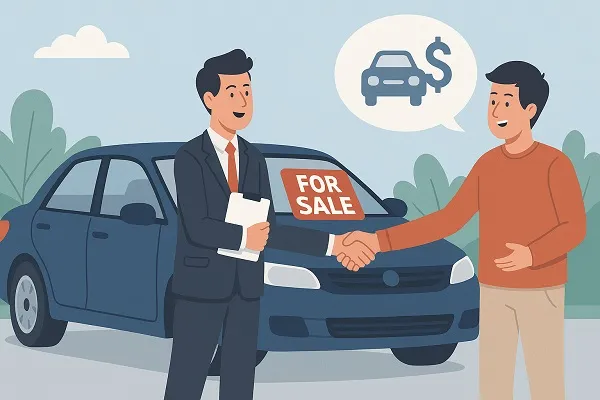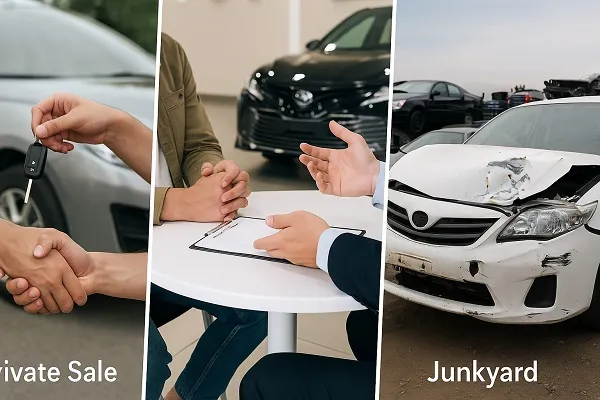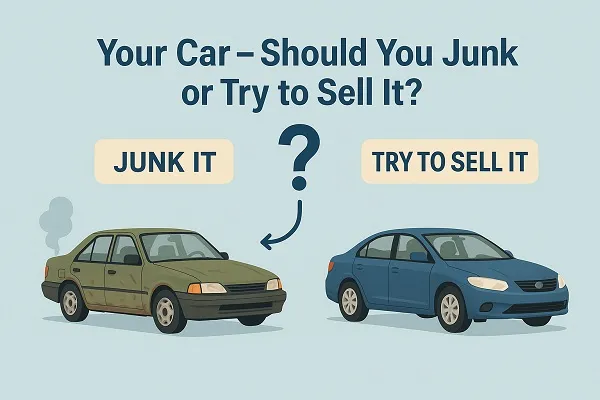Deciding whether to junk your car or try to sell it can be a tough call. The choice depends on your vehicle’s condition, market demand, and how much effort you’re willing to invest. Understanding what makes one option better than the other can help you make a smart financial decision while avoiding unnecessary headaches.
Evaluating Your Car’s Current Condition
Before making any decision, take an honest look at your car’s condition. Consider:
- Mechanical reliability: Does the engine start easily? Are there recurring issues that cost more to fix each time?
- Mileage and age: High-mileage, older vehicles tend to have declining resale value.
- Cosmetic appeal: Dents, faded paint, or a damaged interior can drastically lower its value.
- Repair costs: If repair bills exceed the car’s worth, it’s a strong sign it might be time to junk it.
A mechanic’s inspection can give you a professional opinion. Sometimes, a small repair or tune-up can make the car sellable. But if the list of problems is long, junking may be more practical.
When Selling Your Car Makes Sense

Selling your car is usually worthwhile if it’s still running and in decent shape. Even if it’s old, there are buyers looking for affordable used cars.
Benefits of Selling
- Higher return: You’ll often get more money than a junkyard offer.
- More options: Private buyers, online marketplaces, and dealerships provide multiple selling routes.
- Control over price: You can negotiate or set your asking price based on market value.
How to Increase Your Selling Chances
- Clean your car thoroughly — inside and out.
- Fix small issues like lights, wipers, or cosmetic damage.
- Gather maintenance records and receipts.
- Take clear photos and write an honest description highlighting reliability and value.
A car that’s clean, functional, and well-documented attracts buyers faster and can sell at a better price.
When It’s Better to Junk Your Car
Sometimes, selling just isn’t worth the time or effort. If your car no longer runs or would cost more to fix than it’s worth, junking may be the smarter move.
Signs It’s Time to Junk It
- Repairs cost more than the car’s value.
- Major components like the engine or transmission have failed.
- The car has been sitting unused for months.
- It has severe rust, frame damage, or flood damage.
Junkyards and salvage buyers often pay cash on the spot, even for non-running vehicles. They’ll usually tow it away for free, saving you additional hassle.
Junking Your Car the Smart Way
If you decide to junk your car, don’t rush the process. Taking a few extra steps can help you maximize what you get.
Steps to Take
- Get multiple quotes. Contact several junkyards or scrap buyers to compare offers.
- Remove valuable parts. Items like new tires, battery, or catalytic converter can be sold separately.
- Prepare paperwork. Have your title ready to transfer ownership properly.
- Cancel insurance and registration. This ensures you don’t pay for coverage you no longer need.
Even an old, non-running car has value in its metal and parts. By handling the process correctly, you can turn a dead vehicle into quick cash.
Private Sale vs. Trade-In vs. Junkyard

Each route offers different benefits depending on your priorities.
| Option | Pros | Cons |
|---|---|---|
| Private Sale | Highest potential price | Takes time and effort |
| Trade-In | Quick and easy | Lower offer compared to selling yourself |
| Junkyard | Fast, accepts any condition | Least payout overall |
If convenience is your top concern, junking might win. But if you’re patient and want to maximize profit, a private sale or trade-in could be more rewarding.
Getting the Most Value Out of a Junk Car
Even if your vehicle isn’t drivable, there are ways to squeeze more value from it.
- Sell valuable components individually. Electronics, rims, and catalytic converters can bring good money.
- Donate it for a tax deduction. Some charities accept junk cars and provide donation receipts.
- Contact scrap metal buyers. Sometimes, metal recyclers pay more than junkyards for older vehicles.
A bit of research can mean a few hundred extra dollars in your pocket.
Common Mistakes to Avoid
Many people lose potential value by skipping key steps. Avoid these errors:
- Accepting the first junkyard offer without comparing prices.
- Forgetting to remove personal belongings before pickup.
- Failing to transfer the title, which could cause legal issues later.
- Paying for towing when many junk services include it for free.
Being thorough ensures the process goes smoothly and safely.
Making the Decision: Sell or Junk?
Ask yourself these questions to decide confidently:
- How much is my car worth in its current state?
- What’s the cost of repairs versus potential selling price?
- Do I have time to handle a sale, or do I need it gone fast?
- Is the car still safe and reliable to drive?
If your car still runs well and repairs are minor, selling is likely the better choice. But if it’s costing you more than it’s worth, junking it is often the financially wiser path.
Sometimes keeping an old car just isn’t practical. Whether you choose to sell or junk your car, the key is to evaluate honestly and act strategically. A smart decision now can save money, free up space, and help you move forward with confidence.
Content reviewed and published by Sell My Car Colorado Editorial Team.
